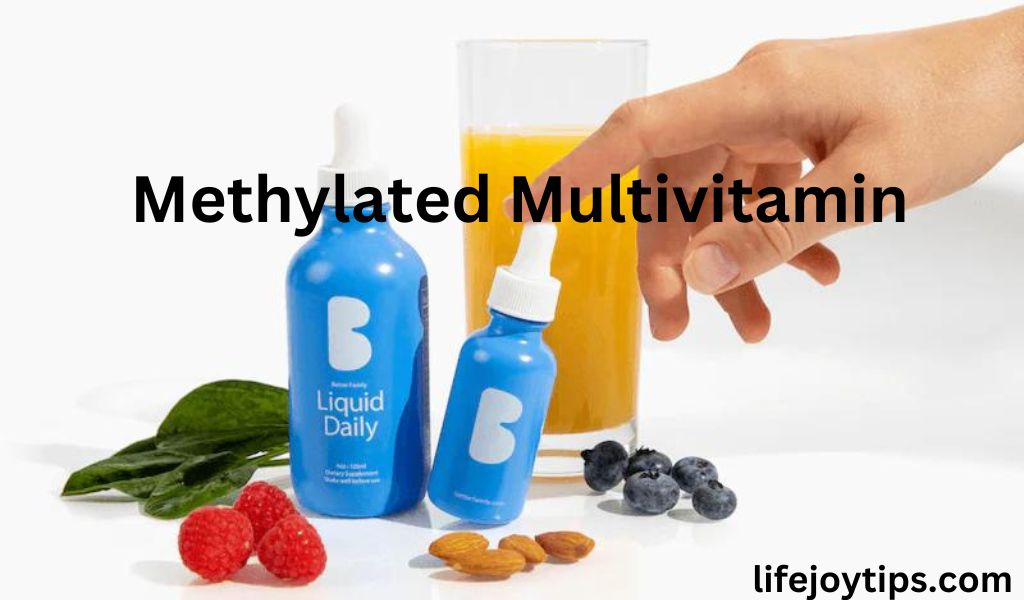Introduction to Methylated Multivitamins
In today’s fast-paced world, maintaining optimal health can be a challenge, making multivitamins a staple in many people’s daily routines. However, not all multivitamins are created equal. Among the array of choices, methylated multivitamins stand out as a superior option, particularly for those who may have difficulty processing traditional forms of vitamins. But what exactly makes a methylated multivitamin different, and why might it be the better choice for you?
Understanding the intricate details of methylated vitamins requires a deep dive into their unique characteristics and the vital role they play in supporting overall health. Unlike standard multivitamins, methylated versions contain active forms of B vitamins that your body can use immediately, bypassing potential issues related to vitamin conversion.
Understanding the Importance of Multivitamins
Multivitamins have long been recognized as a convenient way to ensure you’re getting essential nutrients that might be missing from your diet. These supplements typically include a combination of vitamins, minerals, and other nutritional elements designed to fill in dietary gaps and support overall health. But, the effectiveness of these nutrients can be influenced by how well your body processes them.
This is where methylated multivitamins come into play. They provide nutrients in their active, bioavailable forms, which can be especially beneficial for individuals with certain genetic variations or health conditions that impair their ability to convert inactive vitamins into their active forms.
What Does Methylated Mean in Supplements?
The term “methylated” refers to the presence of a methyl group (one carbon atom bonded to three hydrogen atoms) in the chemical structure of a vitamin. This methyl group plays a crucial role in the methylation process, a vital biochemical reaction that occurs in every cell of the body. Methylation affects a wide range of bodily functions, including DNA synthesis, detoxification, neurotransmitter production, and the regulation of gene expression.
In the context of supplements, methylated vitamins, such as methylfolate (the active form of folic acid) and methylcobalamin (the active form of B12), are already in their usable form. This means they do not require conversion by the body, making them particularly beneficial for those with metabolic or genetic issues that hinder this conversion.

The Science Behind Methylated Vitamins
Methylated vitamins are at the forefront of personalized nutrition, offering a more targeted approach to supplementation. These vitamins have undergone a chemical process known as methylation, which is essential for the body’s ability to function optimally.
Methylation and Its Role in the Body
Methylation is a biochemical process that involves the transfer of a methyl group to various molecules, including DNA, proteins, and lipids. This process is crucial for numerous bodily functions, such as detoxification, immune response, energy production, and the synthesis of neurotransmitters.
One of the key aspects of methylation is its role in the conversion of certain vitamins into their active forms. For instance, folate must be converted into methylfolate to be utilized by the body, and vitamin B12 must be converted into methylcobalamin. If this conversion process is impaired, as can happen in individuals with certain genetic mutations like the MTHFR gene mutation, the body may not get the full benefit of these vitamins.
Why Active B Vitamins Matter
Active B vitamins, such as methylfolate and methylcobalamin, are already in the forms that the body can use directly. This is particularly important for B vitamins because they play a pivotal role in energy production, brain function, and the synthesis of DNA and RNA. Without adequate B vitamins in their active forms, these processes can become less efficient, leading to a variety of health issues.
For individuals with an MTHFR gene mutation, which affects up to 40% of the population, the ability to convert folic acid (the synthetic form of folate) into methylfolate is compromised. This can result in elevated homocysteine levels, which are associated with an increased risk of cardiovascular disease, and other health problems. By taking a methylated multivitamin, these individuals can bypass the faulty conversion process and directly receive the nutrients they need.
The Difference Between Folate and Folic Acid
Folate and folic acid are often used interchangeably, but they are not the same. Folate is the natural form of vitamin B9 found in foods like leafy greens, legumes, and citrus fruits. Folic acid, on the other hand, is the synthetic form used in supplements and fortified foods. While folic acid is beneficial, it needs to be converted into its active form, methylfolate, before the body can use it.
For many people, this conversion is not efficient, particularly those with genetic variations like the MTHFR mutation. This is where methylated folate, or methylfolate, becomes essential. Methylfolate is the active form of folate that does not require conversion, making it more effective and accessible for those who struggle with this metabolic process.
Benefits of Methylated Multivitamins
The benefits of methylated multivitamins extend beyond just filling nutritional gaps. By providing vitamins in their active forms, these supplements offer enhanced bioavailability, ensuring that your body can absorb and utilize the nutrients more effectively.
Enhanced Absorption and Bioavailability
One of the primary advantages of methylated multivitamins is their enhanced absorption and bioavailability. Since these vitamins are already in their active forms, they do not require conversion by the body. This allows for more efficient absorption, meaning that a higher percentage of the vitamins are actually used by the body, rather than being lost during the conversion process.
This is particularly important for individuals with conditions that impair nutrient absorption or conversion. By taking a methylated multivitamin, you can ensure that your body is getting the full benefit of the nutrients you’re consuming.
Supporting Mental Health and Cognitive Function
Methylated B vitamins play a crucial role in supporting mental health and cognitive function. B vitamins, particularly B6, B9 (folate), and B12, are essential for the production of neurotransmitters such as serotonin, dopamine, and norepinephrine. These neurotransmitters regulate mood, sleep, and cognitive function.
Studies have shown that individuals with low levels of active B vitamins are at a higher risk for mental health disorders such as depression and anxiety. Methylated multivitamins can help to mitigate these risks by ensuring that the body has adequate levels of the active forms of these essential nutrients.
Promoting Cardiovascular Health
Cardiovascular health is another area where methylated multivitamins can have a significant impact. High levels of homocysteine, an amino acid in the blood, have been linked to an increased risk of heart disease. The body needs adequate levels of folate, B6, and B12 to convert homocysteine into methionine, a harmless amino acid.
For individuals with an MTHFR gene mutation or other metabolic conditions that impair this conversion, taking methylated forms of these vitamins can help to lower homocysteine levels, thereby reducing the risk of cardiovascular disease.
Energy Production and Metabolism Support
B vitamins are vital for energy production and metabolism. They act as coenzymes in the processes that convert food into energy, support the metabolism of carbohydrates, fats, and proteins, and are crucial for the production of red blood cells.
Taking a methylated multivitamin ensures that your body has the active B vitamins it needs to efficiently produce energy and maintain a healthy metabolism. This can lead to improved energy levels, better endurance, and overall vitality.
Who Needs Methylated Multivitamins?
Methylated multivitamins are particularly beneficial for certain groups of people, especially those with specific genetic or health conditions that affect vitamin absorption and utilization.
Genetic Factors: MTHFR Gene Mutation
The MTHFR gene provides instructions for making an enzyme called methylenetetrahydrofolate reductase, which is involved in processing amino acids, particularly homocysteine. Mutations in this gene can reduce the efficiency of folate conversion to methylfolate, leading to an accumulation of homocysteine in the blood.
Individuals with an MTHFR gene mutation are more likely to benefit from methylated multivitamins, as these supplements provide the active forms of B vitamins that their bodies struggle to produce on their own. This can help to reduce homocysteine levels and lower the risk of associated health problems, such as cardiovascular disease and neural tube defects in pregnancy.
Specific Health Conditions Requiring Methylated Vitamins
Certain health conditions also increase the need for methylated vitamins. For example, individuals with chronic fatigue syndrome, fibromyalgia, or other conditions that impair mitochondrial function may benefit from the enhanced bioavailability of methylated vitamins. These vitamins support energy production at the cellular level, which can help to alleviate symptoms of fatigue and improve overall health.
People with digestive disorders such as celiac disease, Crohn’s disease, or irritable bowel syndrome (IBS) may also struggle with nutrient absorption. Methylated multivitamins can help to ensure that these individuals are getting the nutrients they need, even if their digestive systems are not functioning optimally.
Individuals with High-Stress Levels
Chronic stress can deplete the body’s stores of B vitamins, leading to fatigue, mental health issues, and a weakened immune system. Methylated multivitamins can help to replenish these vital nutrients, supporting stress management, energy levels, and overall well-being.
Key Ingredients in Methylated Multivitamins
Methylated multivitamins contain a variety of active ingredients that are crucial for optimal health. Understanding these ingredients and their roles in the body can help you make an informed decision when choosing a supplement.
Methylfolate: The Superior Folate Form
Methylfolate is the active form of folate that your body can use immediately. Unlike folic acid, which requires conversion to be effective, methylfolate bypasses the conversion process, making it a more reliable and efficient form of vitamin B9. This is particularly important for individuals with an MTHFR gene mutation, who may struggle with folic acid conversion.
Methylfolate supports healthy DNA synthesis, red blood cell formation, and homocysteine regulation, all of which are critical for maintaining overall health.
Methylcobalamin: The Active Form of B12
Methylcobalamin is the active form of vitamin B12, essential for nerve function, red blood cell production, and DNA synthesis. Vitamin B12 is also crucial for brain health, as it supports the production of neurotransmitters and protects the brain from oxidative stress.
Unlike cyanocobalamin, the synthetic form of B12 commonly found in supplements, methylcobalamin is readily absorbed and utilized by the body, making it a more effective choice for maintaining adequate B12 levels.
Pyridoxal-5-Phosphate (P5P): The Active B6
Pyridoxal-5-Phosphate (P5P) is the active form of vitamin B6, which plays a vital role in over 100 enzyme reactions in the body, including amino acid metabolism, neurotransmitter synthesis, and hemoglobin production.
P5P is crucial for brain health, hormone regulation, and immune function. By taking P5P in a methylated multivitamin, you can ensure that your body has the active form of B6 it needs to support these critical processes.
Additional Nutrients in Methylated Multivitamins
In addition to methylated B vitamins, many methylated multivitamins also contain other essential nutrients such as vitamin D, magnesium, zinc, and omega-3 fatty acids. These nutrients work synergistically with the methylated B vitamins to support overall health, including immune function, bone health, and cardiovascular health.
Choosing the Right Methylated Multivitamin
Selecting the right methylated multivitamin involves understanding your own health needs, reading labels carefully, and considering factors such as dosage and potential side effects.
How to Read Labels Effectively
When choosing a methylated multivitamin, it’s important to read the label carefully to ensure that you’re getting the active forms of the vitamins you need. Look for ingredients such as methylfolate, methylcobalamin, and P5P, and avoid supplements that contain folic acid or cyanocobalamin, as these forms require conversion and may not be as effective.
Also, pay attention to the dosage of each ingredient to ensure that you’re getting an adequate amount of each vitamin without exceeding safe levels.
Dosage Considerations and Recommendations
The dosage of methylated vitamins can vary depending on individual needs and health conditions. It’s important to follow the recommended dosage on the supplement label, and to consult with a healthcare provider if you have any concerns about the appropriate dosage for your specific situation.
In some cases, higher doses of methylated vitamins may be necessary, particularly for individuals with genetic mutations or health conditions that impair nutrient absorption or utilization. However, it’s important to approach higher dosages with caution, as excessive intake of certain vitamins can lead to side effects or interactions with other medications.
Potential Side Effects and Interactions
While methylated multivitamins are generally safe for most people, they can cause side effects in some individuals, particularly if taken in high doses. Common side effects may include nausea, headaches, or digestive issues. Additionally, some people may experience a temporary increase in energy levels, which can lead to restlessness or difficulty sleeping if the supplement is taken later in the day.
It’s also important to be aware of potential interactions with other medications, particularly those that affect the methylation process or nutrient absorption. If you’re taking medications for conditions such as depression, anxiety, or cardiovascular disease, consult with your healthcare provider before starting a methylated multivitamin to ensure that there are no contraindications.
Methylated Multivitamin vs. Standard Multivitamin
When comparing methylated multivitamins to standard multivitamins, the key differences lie in the forms of the vitamins and their impact on health outcomes.
Differences in Nutrient Forms
Standard multivitamins often contain the synthetic forms of vitamins, such as folic acid and cyanocobalamin, which require conversion by the body into their active forms. For individuals with no issues in this conversion process, these forms may be sufficient. However, for those with genetic mutations, health conditions, or absorption issues, these synthetic forms may not be as effective.
Methylated multivitamins, on the other hand, contain the active forms of vitamins that the body can use immediately, bypassing the need for conversion. This makes them a more reliable option for individuals with specific health needs or genetic variations.
Impact on Health Outcomes
The impact of methylated versus standard multivitamins on health outcomes can be significant, particularly for individuals with impaired nutrient absorption or utilization. By providing the body with the active forms of essential vitamins, methylated multivitamins can help to improve overall health, reduce the risk of chronic diseases, and support mental and cognitive function.
For example, studies have shown that individuals with an MTHFR gene mutation who take methylated folate have lower homocysteine levels and a reduced risk of cardiovascular disease compared to those who take folic acid. Similarly, taking methylated B12 has been associated with improved cognitive function and a reduced risk of neurological disorders.
Conclusion: The Future of Methylated Multivitamins
As awareness of personalized nutrition continues to grow, methylated multivitamins are becoming an increasingly popular choice for individuals looking to optimize their health. By providing the body with the active forms of essential vitamins, these supplements offer enhanced bioavailability and efficacy, particularly for those with genetic mutations or health conditions that impair nutrient absorption and utilization.
The future of methylated multivitamins looks promising, with ongoing research and innovation in the field of personalized nutrition. As more people become aware of the benefits of methylated vitamins, we can expect to see a continued shift towards these more effective and targeted supplements.
In conclusion, whether you’re dealing with specific health issues or simply looking to ensure that your body is getting the nutrients it needs, a methylated multivitamin may be the right choice for you. By understanding the science behind these supplements and choosing the right product for your needs, you can take an important step towards achieving optimal health and wellness.
Also Read: How Long Does Meth Stay in Your System: Methamphetamine Metabolism
FAQs About Methylated Multivitamins
What is the difference between folic acid and methylfolate?
Folic acid is the synthetic form of vitamin B9, while methylfolate is the active form that the body can use immediately. Methylfolate is more effective for individuals with genetic mutations that impair folic acid conversion.
Are methylated multivitamins safe for everyone?
Methylated multivitamins are generally safe for most people, but it’s important to consult with a healthcare provider, especially if you have specific health conditions or are taking other medications.
Can I take a methylated multivitamin if I don’t have an MTHFR mutation?
Yes, methylated multivitamins can be beneficial for everyone, as they provide the active forms of vitamins that the body can use directly. They are particularly useful for individuals with absorption or conversion issues.
How long does it take to notice benefits from methylated multivitamins?
The time it takes to notice benefits can vary depending on individual health conditions and nutrient levels. Some people may experience improvements in energy and mood within a few days, while others may take several weeks to notice significant changes.
Are there any side effects of taking methylated multivitamins?
Side effects are generally mild and may include nausea, headaches, or digestive issues. It’s important to follow the recommended dosage and consult with a healthcare provider if you experience any adverse effects.
Should I consult a doctor before starting a methylated multivitamin?
Yes, it’s always a good idea to consult with a healthcare provider before starting any new supplement, especially if you have underlying health conditions or are taking other medications.








